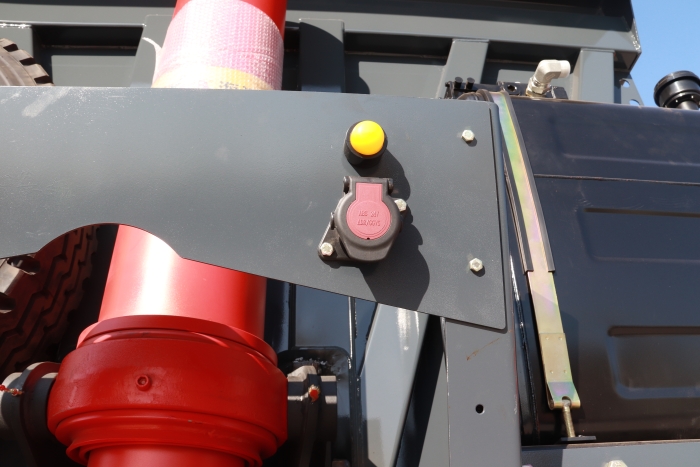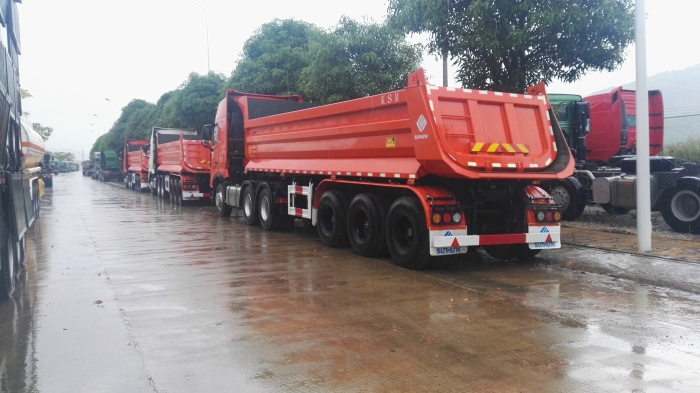- PRODUCTS
- SOLUTION
- SERVICE
- NEWS
- ABOUT US
Enclosed semi trailers use GPS tracking, biometric locks, and 24/7 monitoring systems to secure high-value cargo, reducing theft by up to 75%.
Transporting high-value cargo presents a unique set of challenges, including the risk of theft, damage, and loss. The importance of ensuring the safety of such cargo cannot be overstated, as it often comprises valuable commodities like electronics, pharmaceuticals, luxury goods, and critical industrial components. Consequently, the logistics industry invests significantly in secure transportation solutions to mitigate these risks.
Enclosed semi trailers play a pivotal role in the secure transportation of high-value cargo. These trailers offer a robust solution by providing a sealed environment that protects the cargo from external elements and unauthorized access. Additionally, their adaptability to incorporate advanced security features makes them an indispensable asset in the logistics chain.
Enclosed semi trailers are designed with a focus on strength, durability, and security. The basic structure consists of a rigid frame made from high-strength steel or aluminum, covered by panels that create a sealed cargo space. This design ensures maximum protection against physical damage and weather elements, safeguarding the cargo throughout its journey.
The choice of materials for constructing enclosed semi trailers significantly impacts their security. Steel, known for its strength and durability, offers excellent resistance to attempts at breaking and entering. On the other hand, aluminum, while lighter, provides a balance between security and fuel efficiency due to its lower weight. Manufacturers often employ a combination of these materials to optimize both security and performance.
In summary, the structural features of enclosed semi trailers, from their robust design to the strategic choice of materials, play a crucial role in providing physical protection for high-value cargo. The ability to integrate advanced security features further solidifies their position as a preferred choice for the transportation of valuable goods. With these measures in place, the logistics industry can offer a reliable and secure transportation solution that meets the high standards required for high-value cargo.

The security of high-value cargo during transportation significantly depends on the effectiveness of the locking systems and access control measures implemented. Enclosed semi trailers employ a variety of locking mechanisms, ranging from traditional locks to sophisticated electronic and biometric systems, to prevent unauthorized access and ensure the safety of the cargo.
Enclosed semi trailers utilize both traditional locks and electronic locks to secure cargo. Electronic locks, on the other hand, offer advanced security features including remote locking and unlocking capabilities, which allow for real-time control and monitoring of access points.
Electronic locks are particularly valuable for their ability to integrate with broader security systems, enabling functionalities such as automatic locking upon door closure or triggering alarms if an unauthorized access attempt is detected. These systems can also generate access logs, providing a record of when and by whom the trailer was accessed.
To further enhance security, enclosed semi trailers are increasingly incorporating access control technologies such as biometric systems and electronic access control systems. Biometric systems, including fingerprint and facial recognition technologies, ensure that only authorized personnel can access the cargo area. This level of security is critical for transporting highly sensitive or valuable cargo, as it significantly reduces the risk of theft or tampering.
Electronic access control systems offer the flexibility to customize access permissions for different users and to change these permissions as needed. This adaptability is crucial for logistics operations where access needs may vary over time.
The integration of GPS tracking systems and other monitoring devices plays a crucial role in enhancing the security of high-value cargo during transportation.
GPS tracking systems enable real-time monitoring of the trailer's location, offering an invaluable tool for logistics companies to ensure the safety of their cargo. These systems allow for the immediate identification of any unauthorized route deviations or unexpected stops, potentially indicating tampering or theft.

Beyond GPS tracking, enclosed semi trailers often feature video surveillance systems and cargo sensors. Cargo sensors can detect changes within the cargo area, such as unexpected movement or door openings, triggering alerts to the appropriate personnel.
The combination of GPS tracking, video surveillance, and cargo sensors creates a comprehensive security network that safeguards high-value cargo from theft and tampering.
In summary, the security of enclosed semi trailers relies on a multi-layered approach, combining advanced locking systems, access control technologies, and monitoring devices. These measures ensure that high-value cargo remains secure throughout its journey, providing peace of mind for both shippers and recipients. The continuous evolution of these technologies reflects the logistics industry's commitment to safeguarding valuable goods against the ever-present threat of theft and loss.
Ensuring the security of high-value cargo extends beyond physical and technological measures to include comprehensive internal management strategies. These strategies encompass cargo loading procedures and driver training programs designed to minimize risks during transportation.
Effective cargo loading strategies are crucial for preventing damage and deterring theft. Additionally, placing high-value items in less accessible locations within the trailer can make it more difficult for thieves to access them quickly.
Procedures for securing cargo inside the trailer are equally important. Utilizing high-quality straps, locks, and barriers prevents cargo from shifting during transit, which can lead to damage.
Driver training programs are essential for enhancing the overall security of high-value cargo. These programs should cover:
· Security awareness: Educating drivers on the potential risks and signs of tampering or theft.
· Best practices for cargo security: Including secure parking techniques, route planning to avoid high-risk areas, and the proper use of security technologies available in the trailer.
· Emergency procedures: Training drivers on how to respond in the event of a security breach or accident to minimize loss and ensure their safety.
Having robust emergency response and recovery plans in place is vital for quickly addressing incidents that may occur during the transportation of high-value cargo.

Immediate and effective emergency response measures are critical to preventing or mitigating cargo loss. These measures include:
· Real-time alert systems: Ensuring that any unauthorized access or deviations from planned routes trigger an immediate alert to the control center.
· Rapid response teams: Having teams ready to respond to alerts and investigate potential security breaches or recover stolen cargo.
Recovery plans are essential for quickly resuming operations after a theft or loss incident. These plans should detail the steps to be taken, including:
· Notification procedures: Ensuring that relevant authorities and stakeholders are promptly informed about the incident.
· Assessment and investigation: Quickly assessing the situation to understand what was lost or damaged and initiating an investigation to recover the items and prevent future incidents.
· Continuity strategies: Implementing strategies to continue operations with minimal disruption, which may involve rerouting other shipments or utilizing backup assets.
In conclusion, ensuring the security of high-value cargo requires a comprehensive approach that includes not only physical and technological measures but also internal management strategies. By implementing effective cargo loading procedures, comprehensive driver training, and robust emergency response and recovery plans, logistics companies can significantly reduce the risks associated with transporting high-value cargo. These measures not only protect the cargo but also ensure the safety of the drivers and contribute to the smooth operation of the logistics chain.